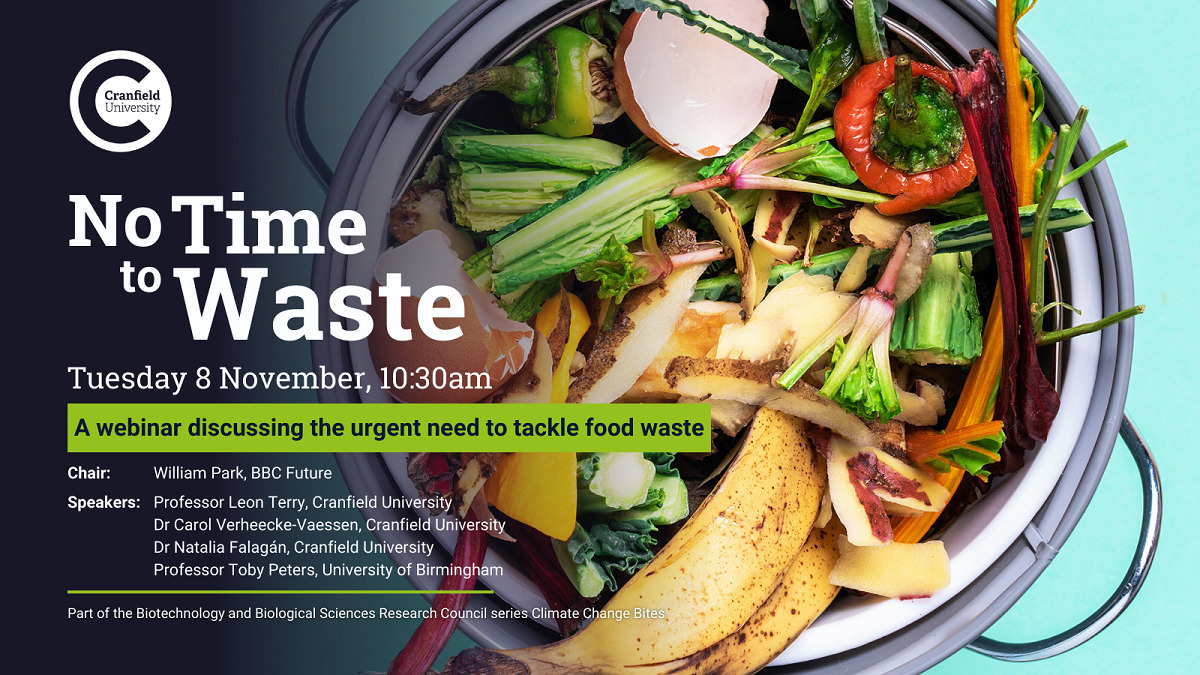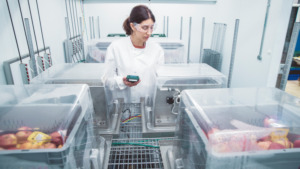No Time to Waste: webinar explores food production and security
01/11/2022

The majority of the world continues to live in a fantasy of plenty and endless choice when it comes to food supplies. But with 250 million acres of agricultural land expected to be lost by 2050, and a 49% growth in population, a dose of reality is coming.
Food needs to be treated as a precious commodity throughout its cycle, from field to fork, as short-lived bubbles of nutrition. That’s why experts and industry are coming together for the ‘No time to waste’ webinar, hosted by Cranfield on 8 November 2022, chaired by BBC Future’s William Park.
The event takes place during the week of COP27. We need to keep issues of food security — sometimes overlooked in the thick of debates over carbon emissions — high on the sustainability agenda. Disruption to food supplies, after all, will be the most immediate and far-reaching of human crises as a result of climate change and environmental damage.
The webinar, part of the Biotechnology and Biological Sciences Research Council series Climate Change Bites, will take on the core issues: in particular, the need to take a joined-up approach to tackling food waste. Because traditionally, issues have been looked at separately, whether that is pre-harvest, post-harvest, storage, supply chains, energy use. There is no good in devising low-energy refrigeration for transportation, for example, if the resulting foods have a low nutritional value.
Cranfield’s current research is feeding into the holistic approach, finding practical ways to minimise food loss and waste, and ensure there is positive change across food supply chains.

Cold chain reseach at Cranfield
Since 2020, we have been involved with developing the Africa Centre of Excellence for Sustainable Cooling and Cold Chain. This has meant listening to farmers’ needs and particular challenges and consequently providing training on how to grow crops and manage distribution in ways that minimise food loss, making use of sustainable cooling and cold-chain solutions — a virtuous circle for farmers and consumers. Higher quality products mean more income, access to certifications and new markets (both on the continent and overseas), leading to stronger foundations to local and national economies, resilience and security.
More than 60% of our food is dependent on cold-chain storage and transportation. The Zero Emission Cold-Chain (ZEC) group of partner universities, led by the University of Birmingham, is identifying UK hotspots for food loss and waste relating to the food cold-chain, and how the high energy demand involved can be reduced. With this kind of map, we can better target actions, integrating thinking over issues such as engineering and food quality/safety, behaviours, finances and business models.
Other Cranfield projects are looking at supporting technologies; such as refining the use of controlled atmospheres in food storage to help extend product shelf life. A useful current method of slowing down rates of ripening and decay is to reduce levels of oxygen and increase carbon dioxide. But changing the proportion of gases in the atmosphere creates amounts of stress in foods, causing them to develop defence mechanisms which speeding up the ripening process, at least for a number of hours.
Our research is looking at how the benefits from reducing oxygen can be maintained without the unwanted side-effects through the use of gradual changes in the controlled atmosphere, analysing changes in physiological and biochemical properties, such as respiration rate, ethylene production, decay, weight loss, firmness and bioactive compounds. Opportunities for its use by industry are now being explored.
Sustainability means making the very best of the natural resources we have, and that will increasingly depend on joined-up thinking around food production and its security.
The ‘No time to waste’ webinar will be streamed on 8 November 2022 at 1030am – sign up now.
Categories & Tags:
Leave a comment on this post:
You might also like…
Keren Tuv: My Cranfield experience studying Renewable Energy
Hello, my name is Keren, I am from London, UK, and I am studying Renewable Energy MSc. My journey to discovering Cranfield University began when I first decided to return to academia to pursue ...
3D Metal Manufacturing in space: A look into the future
David Rico Sierra, Research Fellow in Additive Manufacturing, was recently involved in an exciting project to manufacture parts using 3D printers in space. Here he reflects on his time working with Airbus in Toulouse… ...
A Legacy of Courage: From India to Britain, Three Generations Find Their Home
My story begins with my grandfather, who plucked up the courage to travel aboard at the age of 22 and start a new life in the UK. I don’t think he would have thought that ...
Cranfield to JLR: mastering mechatronics for a dream career
My name is Jerin Tom, and in 2023 I graduated from Cranfield with an MSc in Automotive Mechatronics. Originally from India, I've always been fascinated by the world of automobiles. Why Cranfield and the ...
Bringing the vision of advanced air mobility closer to reality
Experts at Cranfield University led by Professor Antonios Tsourdos, Head of the Autonomous and Cyber-Physical Systems Centre, are part of the Air Mobility Ecosystem Consortium (AMEC), which aims to demonstrate the commercial and operational ...
Using grey literature in your research: A short guide
As you research and write your thesis, you might come across, or be looking for, ‘grey literature’. This is quite simply material that is either unpublished, or published but not in a commercial form. Types ...







